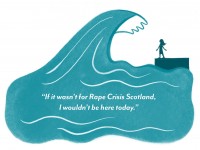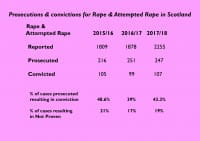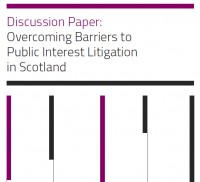News

RCS urges MSPs to support Coronavirus (Scotland) Bill provisions
Briefing Coronavirus (Scotland) Bill | Rape Crisis Scotland
The prospect of giving evidence in a rape or sexual offence trial can be extremely daunting. Delays in cases coming to court can have a very detrimental impact for people reporting sexual crimes. Even before the current pandemic, Rape Crisis Scotland had serious concerns about delays in rape and attempted rape cases getting to court, with many people having to wait up to two years for their case to get to court. Lengthy delays, coupled with uncertainty about when they are going to be giving evidence, adds significantly to the trauma caused by the justice process. It also impacts on their ability to give their best evidence. We are gravely concerned about the impact on people reporting sexual offence cases of the current arrangements where no new jury trials are being held. Although we recognise the action taken by the court service was necessary, we are very concerned about the knock-on effect of such delays on the capacity of the courts which is likely to have long term consequences for all survivors seeking justice.
We are supporting a number of survivors through Rape Crisis Scotland’s National Advocacy Project who were due to have jury trials at the High Court within the next few months; we are concerned about the impact of these trials being delayed for an unspecified time period. This uncertainly is causing a great deal of distress for survivors who felt the end of the process was in sight.
Survivors often describe feeling stuck by the Criminal Justice Process and unable to move on with their lives and we worry about the impact of these delays on the mental health of the survivors affected. We know of a number of cases which have already had to be adjourned on a couple of occasions now being adjourned for a third or fourth time. These survivors could face a delay of a further 9 + months to a conclusion of the justice process. If nothing is done, there will be a huge backlog of cases when the courts do reopen to jury trials. The Lord Justice General estimates a backlog of over 1000 cases if the current restrictions are lifted by the start of the summer, a timescale which is by no means guaranteed. We are seriously concerned about what this will mean for people reporting rape and sexual offences.
We would urge members to vote in favour of the provisions in the emergency legislation permitting the use of judge led trials to allow for the most serious cases to proceed during this period.
Guide to the criminal justice system for survivors of sexual violence: updated
Rape Crisis Scotland have today (Wednesday 10th July 2019)
launched an updated video guide to the criminal
 justice system for survivors of
sexual violence, featuring key people that survivors will come into contact
with during the justice process.
justice system for survivors of
sexual violence, featuring key people that survivors will come into contact
with during the justice process.
This includes a specially trained police officer, a rape crisis advocacy
worker, a Procurator Fiscal, a defence lawyer, an advocate for the prosecution
and a judge.
Funded by the Scottish Government, the video is an accessible and comprehensive guide to a system that many survivors describe as complex and disorientating. It sets out clearly each stage of the process, who is involved and what their role is. It is hoped that – in addition to ongoing work to improve the justice system for survivors of sexual violence – the video will increase access to justice for crimes that are widely underreported.
Fairness, dignity and justice - changing Scotland's response to sexual crimes
A judicially led review, chaired by the Lord Justice Clerk Lady Dorrian, will develop new proposals for how sexual offences are dealt with within the Scottish Criminal Justice System.
At Rape Crisis Scotland we consistently hear that many survivors feel let down by the justice process, and yet the volume and complexity of sexual offences has grown so much in recent years that the majority of High Court trials now relate to recent or historical sexual offences. This review is clearly a significant opportunity to think creatively and practically about building a system that has fairness and dignity at its heart.
According to the Judiciary, the review group – which will be made up of judiciary and representatives of the Scottish Courts and Tribunals Service, Police, COPFS, justice agencies and third sector organisations – will look at the opportunities to manage cases in a way which is efficient, delivers justice as locally as possible at the earliest opportunity, and improves the experience of complainers in giving their evidence.
“We are hopeful about the potential this review brings because it is impossible to underestimate just how necessary and urgent action on improving rape survivors experience of the justice system is. What is especially welcome is the approach of Lady Dorrian in looking at the prosecution of sexual offences cases with a blank slate - this gives all of us the opportunity to think creatively and imagine a system that protects both the human rights of those accused of serious sexual crime, and those who are complainers.
"It's never going to be easy to pursue justice following rape or sexual violence, but there are concrete actions that can be taken to reduce the trauma currently experienced by complainers. We look forward to working closely with Lady Dorrian and the whole group on this important issue."
– Sandy Brindley, Rape Crisis Scotland
“This is an opportunity for all the organisations involved to look at the overview of sexual offences prosecuted in our courts and deliver an improved approach to ensure that these cases are dealt with as efficiently and effectively as possible for all concerned. It will also consider how to improve the experience of victims when giving their evidence.”
– Lady Dorrian
New figures show almost 1 in 5 trials for rape/attempted result in Not Proven

New figures released today by the Scottish Government show that almost one in five trials for rape or attempted rape result in a Not Proven verdict.
The figures also show a fall in the number of prosecutions but a slight increase in the number of convictions.
• Almost one in five rape and attempted rape trials result in a not proven verdict.
• 43% of rape and attempted rape trials result in a conviction.
Tackling barriers to strategic court cases in Scotland
Today sees the publication of a new report,
Overcoming Barriers
to Public
 Interest Litigation in Scotland, which explores why
there is a lack of strategic court action in Scotland and suggests recommendations
to address this.
Interest Litigation in Scotland, which explores why
there is a lack of strategic court action in Scotland and suggests recommendations
to address this.
It suggests key
barriers are:
- Poor access to information about court cases;
- Limitations to who can take a case to court;
- Short time-limits for taking cases;
- Inhibitive costs and financial risk;
- A limited culture of using public interest litigation to bring change.
Authors Clan Childlaw, Human Rights Consortium Scotland, Amnesty International, Friends of the Earth Scotland, Shelter Scotland, JustRight Scotland and Rape Crisis Scotland are clear that if we are to see human rights progressed in Scotland, we need more NGOs to be able to pursue strategic cases.
Latest posts
- Rape Crisis Scotland chief executive steps down after 24 years
- Our response to Lord’s Advocate’s letter
- We talk a lot about the rise of rape and sexual violence, let’s talk about how to stop it
- Statement: Supreme Court ruling on Daly v HM Advocate; Keir v HM Advocate
- An open letter: Women against the Far Right Scotland